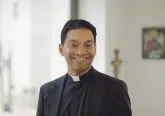The Catholic Moment: Conscience and adult faith
Thursday, April 15, 2010
By Father Earl Fernandes
April 16, 2005, marked Cardinal Joseph Ratzinger’s 78th birthday. He had a small gathering at the Holy Office to celebrate. He told his colleagues that he intended to stay for a short while to help the new pope and then to retire to his native Germany to pursue his academic interests.
As dean of the College of Cardinals, he played a central role in organizing the conclave after the death of Pope John Paul II, and though he preached a brilliant homily at the late pope’s funeral, he was still an unlikely candidate for the papacy until April 18. As dean, he preached the Mass for the election of the Roman pontiff.
Studying in Rome at the time and having followed Cardinal Ratzinger’s writings for some time, I thought, “This may be the last time I ever see him or hear him speak. I should go to that Mass.”
It was only after that Mass that I believed Cardinal Raztinger might be elected pope. Why? In a previous article (“Conscience: Always Right?”), I indicated that Vatican II (Gaudium et Spes, 16) rightly highlighted the dignity of conscience, properly understood as connected with the truth. During this Mass, Cardinal Ratzinger attacked the “dictatorship of relativism” as a direct challenge to Christian faith. The context of his remarks was “maturity in Christ” or being an adult in the faith. In a general way, this was an underlying theme of Vatican II: The faithful were not to be treated as children but were called to adulthood. Cardinal Ratzinger likened being a child to being “tossed here and there, carried about by every wind of doctrine” (Ephesians 4:14), which he then compared with relativism:
“How many winds of doctrine we have known in recent decades, how many ideological currents, how many ways of thinking. . . . The small boat of thought of many Christians has often been tossed about by these waves — thrown from one extreme to the other. . . . Having a clear faith, based on the Creed of the church, is often labeled today as fundamentalism. Whereas, relativism, which is letting oneself be tossed and swept along by every wind of teaching, looks like the only attitude (acceptable) to today’s standards. We are moving towards a dictatorship of relativism which does not recognize anything as certain and which has as its highest goal one’s own ego and one’s own desires. However, we have a different goal: the Son of God, true man. He is the measure of true humanism. Being an adult means having a faith which does not follow the waves of today’s fashions or the latest novelties. A faith which is deeply rooted in friendship with Christ is adult and mature. It is this friendship which opens us up to all that is good and gives us the knowledge to judge true from false, and deceit from truth. We must become mature in this adult faith. . . . And it is this faith — only faith — which creates unity and takes form in love.”
Incredibly, at the end of his homily, St. Peter’s Basilica erupted in applause. The Christian faithful responded with joy from their hearts to this truth. The dignity of conscience is intimately tied to the connection with the truth, which, as the Holy Father pointed out five years ago, becomes clear through friendship with Christ. Clergy and laity complain that it is hard to tell right from wrong today.
We need to re-focus on our goal: the Son of Man. Christian morality is not an abstraction, nor is it a set of rules. It is about cultivating friendship with Jesus, of living in Christ. This is the essence of being an adult in faith.
Father Fernandes is an assistant professor of moral theology and dean of Mount St. Mary’s Seminary.













